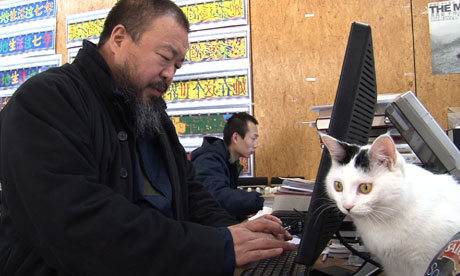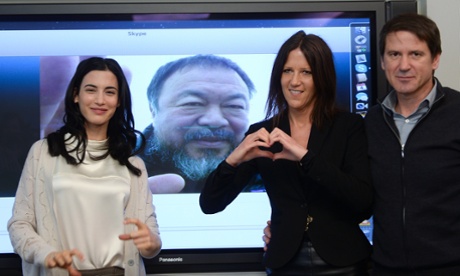Sometimes, as a film-maker, you just need to be in the right place at the right time. Alison Klayman, an American freelance journalist working in China, was Johnny on the spot, and her documentary about artist-activist Ai Weiwei has, through Ai's own rocketing international profile, become an essential portrait of a key contemporary figure.
Klayman picks up Ai's story in 2009, as he is beginning to prepare for what became the Sunflower Seeds installation at Tate Modern, and is already deep into a campaign over the 2008 Sichuan earthquake. Klayman's film suggests that it is this latter activity that was pivotal in triggering Ai's ascent, transforming someone who was an art world cult into a domestic and international figurehead for the pro-democracy movement's confrontation with China's authoritarian system.
Quickly neutralising a well-rehearsed criticism that Ai is not a hands-on creator of his own work (one assistant likens himself to Ai's "assassin" as he carves a bit of plasterwork), Klayman establishes Ai as an ideas-man whose artistic practice and ideological convictions become entangled and merged. It's easy, for example, to see his attempt to sue a Chengdu police officer for assault — videoed and tweeted every step of the way – as a months-long piece of performance art, as well as a test case of China's opaque bureaucracy. Or the act of being photographed at Tate Modern with a handful of those ceramic seeds as an act of political theatre.
But in Klayman's film, at least, everything goes back to the earthquake campaign. The list of names of school-kid victims, that the government won't release, becomes an artwork in itself. The miserable sight of their discarded backpacks in the earthquake rubble is transformed into the primary motif in a giant display outside his So Sorry exhibition in Munich. And, as an avid Twitter user, his call for people to each record themselves speaking a single name of an earthquake victim forms an undeniably moving digital art happening.
Of course, Ai has one or two rock-star-esque blind spots that don't quite match up to the wise-teacher persona he has adopted: notably his unfazed announcement that no one minds he's just cheated on his wife and had a child. (See the Bob Marley doco by Kevin Macdonald for similar smugness.) The kid's cute, though, and when Ai lets him play in the Tate's sea of sunflower seeds, Klayman gets a nice shot out of it.
As a documentary, it's hard to assess Klayman's achievement. On one hand, she had a first-timer's astonishing luck – but everybody has to start somewhere. But she also had to structure and edit a mass of material, which has been done with lucidity and no little degree of intelligent sympathy. Her film closes with Ai, muzzled by stringent bail conditions after 81 days of detention, disappearing behind a firmly closed door. Let's hope Klayman gets to make a sequel.











